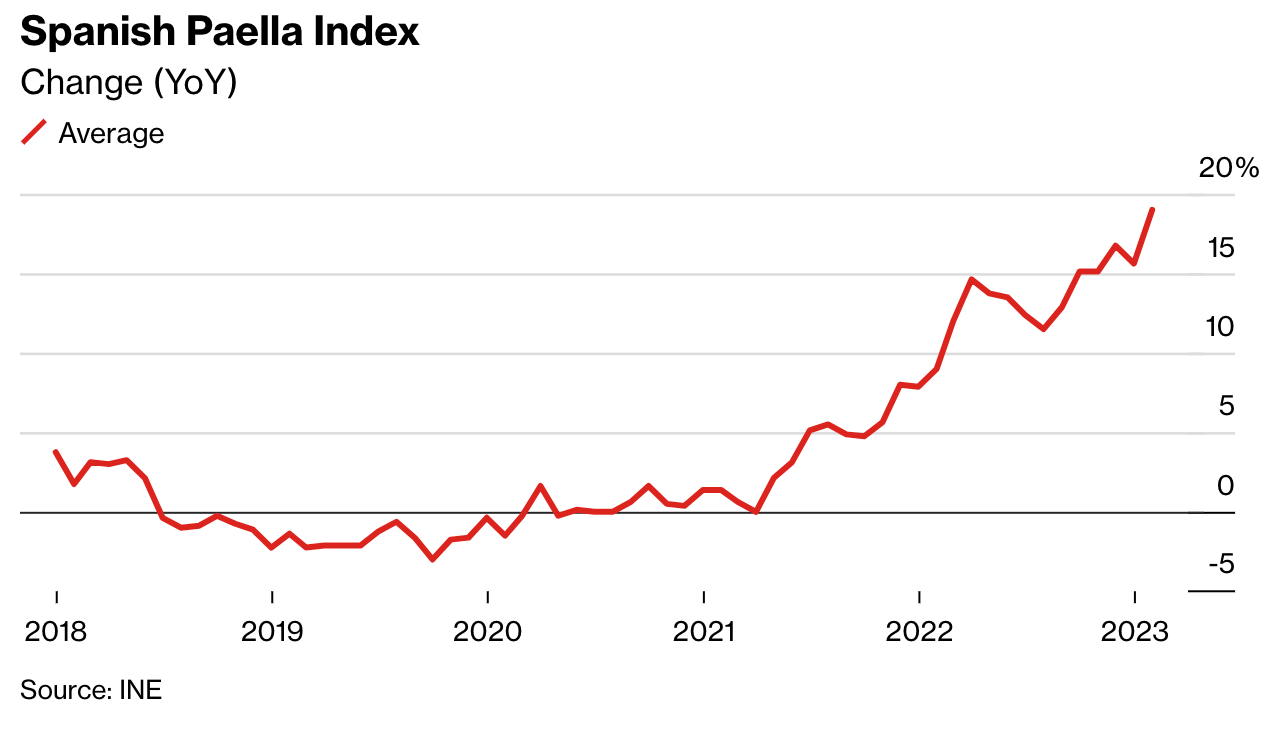🎪 This Week in Spain: First as Tragedy, Then as Farce
Also: Pope trolls the mayor, Spanish drug use, and no Liga for you.
By @IanMount and @AdrianBono | March 22, 2023 | Madrid
🎉 Welcome to the sixth issue of The Tapa The Brief, an English-language, weekly newsletter about all things Spain! And yes, we are trying out a new name—something that (we think) is more likely to be recommended. What do you think?
‼️ Starting this week you will receive this newsletter twice. Today’s edition focuses on politics and hard news. Tomorrow’s edition will feature what to do this weekend, some memes and other random stuff.
🥜 The Week in a Nutshell*: Vox’s push to hold a no-confidence vote in parliament this week became the one thing everyone was talking about.
🕺If you haven’t subscribed yet, please do so by clicking on the button below.
🫶 And if you already have, please send this newsletter around to your friends and family and help us keep growing.
Circus in Town
🎪 Two Days of Our Time That We’ll Never Get Back

What happened? For the second time in less than three years, Spain’s parliament held a no-confidence vote against Prime Minister Pedro Sanchez requested by the far-right party Vox. Surprising exactly zero people, the candidate proposed to take over as Prime Minister, Ramón Tamames, failed to garner the necessary votes.
Okay but… Who is Ramón Tamames? The 89-year-old former communist economist (we covered him a few weeks ago) was Vox’s odd pick to lead the charge against Sánchez. Tamames is a well-known figure in Spain who decided to come out of his political retirement and return to the parliament floor one last time. This reunion tour, unlike those of the Rolling Stones, did not come off well.
The two days of long speeches on the parliament floor essentially consisted of the various political parties A/B testing the attack lines they’re considering for the municipal elections in May and the general election at the end of the year.
When Tamames had the floor, he didn’t do much with it. While the octogenarian said he believed the current coalition government was “one of the worst governments Spain has seen in 80 years” and criticized many of its policies, he did not explain what he would do instead.
In his arguably best line (which is not saying much), Tamames called the Socialist-Podemos coalition in power a “Frankenstein government”. It largely went downhill from there.
Tamames has already said he will write a book about his experience in parliament this week. So it’s not a total loss.
Almost 8.8 million people tuned in to watch at least one minute of the debate. It is very unlikely that many tuned in for a second minute.
Spoiler: Tamames was defeated 53 votes to 201 (and 91 abstentions).
Vox knew beforehand its motion had no chance of success because its only possible ally, the center-right PP, made it clear it would abstain arguing that it wouldn’t vote in favor “out of respect for the Spanish people” and wouldn’t vote against it “out of respect” for Tamames.
PP leader Alberto Núñez Feijóo was so eager not to be connected to the proceedings that he had a long meeting with EU ambassadors in the Swedish ambassador’s residence and then fled to Brussels, where he met with European Commission President Ursula von der Leyen.
This preordained failure likely hurt Vox party leader Santiago Abascal even among his faithful, as knowing the outcome allowed people to spend their time wondering why Abascal had made the amateurish decision to spend the first two days of Spring doing this.
Abascal was hoping to capitalize on the widespread discontent with the coalition government after the scandals surrounding the “only yes means yes” sexual abuse legislation and the Tito Berni corruption case. But, by being such an omnishambles, it may have helped take attention away from those very issues.
Analysts agree that both Prime Minister Sánchez and second vice-premier Yolanda Díaz emerged as the big winners of the week after using the media attention to present their campaign agendas and paint the center-right Partido Popular (PP) as similar to Vox.
The process was a farce. But don’t believe us. Commentators across the political spectrum, from El Mundo to Al Rojo Vivo (and El Español, and….) all agreed on that one piece of vocabulary.
🎞️ B-Roll: Highlights From the No-Confidence Vote
Now that we’ve covered the serious part, let’s go over some of the most memorable moments from this week’s circus parliamentary session.
“We will die.” Let’s begin with the one that was probably the most shared, and that is Tamames’ decision to interrupt President Sánchez’s to complain about the length of his “20-page response”. The floor erupted with laughter, while the parliamentary president reprimanded him for the interruption. Tamames later asked that the parliament to change its rules to shorten the speeches: “You have to select the topics because if we don't we’ll die in three days of speeches.”
“You Women”. During his several interventions and responses, Tamames also criticized the current administration’s foreign policy (Spain’s involvement in the war in Ukraine, the recognition of Morocco’s autonomy plan for the Western Sahara or the use of the word “fascism” to describe the governments of Hungary and Poland). He also went after the coalition government’s feminist policies, arguing that “women are being used like currency” and that “there are more women raped now than before this wave of feminism”. He also complained about the lack of childbearing by Spanish women.

No Spanish Steve Jobs: Vox’s spokesperson in parliament Ivan Espinosa de los Monteros used part of his time to explain why Steve Jobs (?) would have never prospered under the Sánchez regime. Well, in fact, he said maybe he would have “never been born because he was the result of a young girl’s unwanted pregnancy.” (Abortion. Get it?). In Sanchez’s Spain, he continued, the garage where Jobs started Apple would have also been shut down for “failing to comply with 3,000 norms” He also didn’t have to deal, he said, with Equality minister Irene Montero yelling at him for having an “all-men” team in his company. Anyway, you see where this is going. “Think different”, he repeated several times referring to Apple’s former advertising slogan.
🔔 A Message From Our Sponsor
Secret Kingdoms is your English bookstore in Madrid. It specializes in Spanish history and literature, contemporary and classic novels, books for children and young adults of all ages, history and historical fiction, thrillers, science fiction, fantasy, poetry, biographies and much more.
Located on Calle de Moratín 7 — a few blocks away from the Prado Museum — and with over 20,000 new and used books, Secret Kingdoms has something for everyone.
Find out more at www.thesecretkingdoms.com
💬 Four things to discuss at dinner parties this week:
1. The I-word is not going away
Spain’s central bank, the BOE, offered its regular update on Spain’s economy this week, and it’s not great news for those of us who like to, well, eat.
While the BOE dropped its expectations for overall inflation in 2023 from 4.9% to 3.7%, and raised its expected GDP growth number from 1.3% to 1.6%, it said food prices would continue to rocket upward.
“Food inflation is already at all-time highs, around 15%,” BOE director general of economics, statistics and research Ángel Gavilán said at the presentation of the update.
The BOE raised its overall prediction for 2023 food inflation from the 7.8% it expected in December to 12.2% now. For every food there is a variety of reasons: the BOE notes as an example the milk industry, where the number of cows fell while the cost to feed them rose. Effects of the war are everywhere.
¡Socarrat! As if on cue, Bloomberg’s paella index of the changing cost of cooking the rice dish returned to its rising ways in February, hitting an all-time high of 19.1%.
2. No hay Liga
The Clásico between Real Madrid and FC Barcelona on Sunday had a little something for everyone.
Barça’s shirts bore the logo for Barcelona-native Rosalía’s album “Motomami” (put there by sponsor Spotify) and Rosalía added a “Motomami” version of the team’s hymn for the occasion.
A late game go-ahead goal by Real Madrid’s Marco Ascensio was disallowed for his position being, quite literally, several millimeters offside.
Controversy over when Barcelona’s Gavi should have been ejected after he knocked down Real Madrid’s Dani Ceballos—or whether Ceballos’ earlier crash into Barça’s Robert Lewandowski made it all even.
An injury-time goal by Barcelona’s Kessié gave the game to the Catalan hosts.
The intense game was played on a knife’s edge for most of its 90 minutes and felt decisive—and it was, as the 12-point advantage it gave Barça over second place Real Madrid means that there is not longer any competition for the top spot (No hay Liga, as they say).
But it papered over La Liga’s inexorable decline in recent years, as the massive influx of money into the Premier League has attracted much of the talent that would have played in Spain in the past.
Five years ago, in the UEFA rankings, Real Madrid was the top European team and three other Spanish sides (Atlético, Barcelona and Sevilla) were in the top six.
Today, only Real Madrid (#5) and Barcelona (#8) are in the top 10. Not surprisingly, over the same period, Premier League clubs have spent over €4bn to buy players from the other four big European leagues (Spain, Germany, France, Italy) while little money has flowed in the opposite direction.
3. “God-Level” trolling
Madrid President Isabel Díaz Ayuso, Mayor José Luis Martínez-Almeida and other regional politicians had an audience with Pope Francisco on Saturday, to commemorate the 400th anniversary of the canonization of Madrid’s patron saint, San Isidro Labrador (if you live in Madrid, you’re well aware that May 15 is his holiday).
The pope’s political leanings are well known (left of center, though complicated), making his match with the PP’s Ayuso and Almeida imperfect. But Almeida undoubtedly didn’t expect what happened next.
After greeting Ayuso, Francisco was presented with Almeida by Madrid’s archbishop, Carlos Osorio. With a mischievous grin, Francisco turns to Osorio and says, “The heir of the great Manuela,” in reference to Manuela Carmena, the left-wing mayor who Almeida defeated to take Madrid’s top job.
The former mayor and the pontiff are friends, or at least friendly. Carmena said Pope Francisco was her “principal backer” when it came to taking in refugees (Madrileños will remember the “Refugees welcome" sign on Cibeles when she was mayor, and how fast it came down when the PP of Almeida took over).
Almeida took the papal trolling in stride. But unlike in the past, when he’s taken to social media to laugh along with others’ jokes about his height, the good humored mayor limited himself to saying the encounter was “very exciting and unforgettable”. Which is undeniably true.
4. White lines
The EU’s drugs agency (EMCDDA) on Wednesday released a multi-year study of what drugs people use in some 100 cities across Europe, measured via wastewater samples. And the results are a pupil-tweaking invitation to indulge in broad cultural stereotypes. They are also interesting.
Southern Europe likes cocaine, while meth is big in the East. Interestingly, amphetamines, usually referring to prescription drugs, are big in Sweden, Belgium, the Netherlands and Germany; their illegal street drug cousin methamphetamines have a home in Czechia and Slovakia.
Spanish cities studied were Barcelona, Tarragona, Lleida, Santiago de Compostela, Valencia and Castellón. Because the eastern coast and Galicia are where the fun is.
Spain really stood out for its cocaine usage, with Tarragona winning the silver medal, behind only Antwerp. The country’s use of amphetamines and meth was almost residual.
Everyone uses cannabis.

🙏 Before you go, (again) please remember to share this newsletter with your friends on social media. The more we grow, the more information we’ll be able to offer each week.
We’ll be back tomorrow with more.






